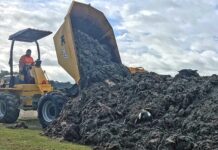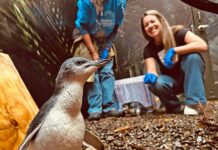Red billed gulls are now as endangered as New Zealand dotterels with numbers plummeting in the Hauraki Gulf.
The gulls used to breed in “huge numbers” at remote islands in the gulf but fishing has reduced their food supply and decimated populations of the seabird, says Auckland Council senior regional advisor for biodiversity, Tim Lovegrove.
“They are a canary in the goldmine.
“There has been enough concern to list red billed gulls as nationally vulnerable which puts them in the same category as New Zealand dotterels.
“It’s mostly a food supply issue,” says Dr Lovegrove.
Thirty years ago, there were “hundreds if not thousands” of red billed gulls breeding at the Mokohinau Islands and Cuvier Island, near Great Barrier.
“Now, there are just a handful of pairs – it has been a big change.”
Boil ups were frequently seen, with trevally and other large fish pushing small fish and shrimps to the surface.
“The red billed gulls would be circling around the boil ups, feeding on shrimps and bringing them back to feed their chicks at the colony.
“Now, the fisheries have cleaned up the trevally schools and you don’t see the boil ups like you used to and the gulls relied on them to feed their chicks.
“The big gull colonies have gone around the breeding islands – there are just sparse colonies dotted around the coastline,” says Dr Lovegrove.
A few “patchy colonies” remain on rocks and small islands around Waiheke, where red billed gulls breed in spring and summer.
“It’s really important that people don’t disturb the colonies when they’re breeding – give them their space.”
New Zealand’s fisheries management quotas need “tightening up” to try to restore fish numbers and ensure the survival of seabirds, he says.
“There has been a lot of criticism of the quota management system and the waste that goes on.
“A reduction of fishing pressure would be the obvious thing to restore the big boil ups we used to see bringing small fish and shrimps to the surface.
“It could be a long recovery process – it’s hard to say how long it could take,” says Dr Lovegrove. • Rose Davis







